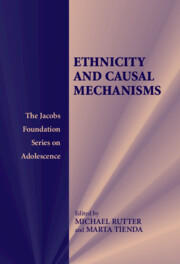Book contents
- Frontmatter
- Contents
- List of Contributors
- Foreword
- Preface
- 1 Natural Experiments, Causal Influences, and Policy Development
- 2 Growing Up Ethnic in the United Kingdom and the United States: Comparative Contexts for Youth Development
- 3 The Multiple Facets of Ethnicity
- 4 Educational Attainments: Ethnic Differences in the United Kingdom
- 5 Race and Ethnic Inequality in Educational Attainment in the United States
- 6 Racial and Ethnic Disparities in Crime and Delinquency in the United States
- 7 Explaining Ethnic Variations in Crime and Antisocial Behavior in the United Kingdom
- 8 Cultural Differences in the Effects of Physical Punishment
- 9 Ethnicity and Mental Health: The Example of Schizophrenia in the African-Caribbean Population in Europe
- 10 Ethnic Variations in Youth Suicide
- 11 Ethnicity and Intergenerational Identities and Adaptations in Britain: The Socio-Political Context
- 12 Assimilation, Dissimilation, and Ethnic Identities: The Experience of Children of Immigrants in the United States
- 13 Deciphering Ethnicity: Reflections on Research Opportunities
- Author Index
- Subject Index
5 - Race and Ethnic Inequality in Educational Attainment in the United States
Published online by Cambridge University Press: 05 July 2014
- Frontmatter
- Contents
- List of Contributors
- Foreword
- Preface
- 1 Natural Experiments, Causal Influences, and Policy Development
- 2 Growing Up Ethnic in the United Kingdom and the United States: Comparative Contexts for Youth Development
- 3 The Multiple Facets of Ethnicity
- 4 Educational Attainments: Ethnic Differences in the United Kingdom
- 5 Race and Ethnic Inequality in Educational Attainment in the United States
- 6 Racial and Ethnic Disparities in Crime and Delinquency in the United States
- 7 Explaining Ethnic Variations in Crime and Antisocial Behavior in the United Kingdom
- 8 Cultural Differences in the Effects of Physical Punishment
- 9 Ethnicity and Mental Health: The Example of Schizophrenia in the African-Caribbean Population in Europe
- 10 Ethnic Variations in Youth Suicide
- 11 Ethnicity and Intergenerational Identities and Adaptations in Britain: The Socio-Political Context
- 12 Assimilation, Dissimilation, and Ethnic Identities: The Experience of Children of Immigrants in the United States
- 13 Deciphering Ethnicity: Reflections on Research Opportunities
- Author Index
- Subject Index
Summary
Introduction
In the United States, as in other modern industrial societies, education is the primary gateway to socioeconomic attainment. The single most important predictor of good jobs and high income is higher education. College graduates have average earnings 70 percent higher than those of high school graduates (Day & Newburger, 2002). With such wide differences in economic outcomes between the education haves and have-nots, most research on economic inequality and the process of social stratification must begin with the determinants of schooling, and in particular, on the transition from high school to college.
Equality of opportunity, which lies at the heart of the American dream of a meritocratic society, is still a distant goal. The fundamental, and inescapable, reality is that families work to subvert equality of opportunity. All parents, or at least most parents, want their children to do well and invest considerable resources and time to sponsor, prod, push, and cajole their offspring. Parents provide economic and social support as well as encouragement to further their children's schooling and subsequent occupational and economic attainment. Not all parents, however, have equal capacity and ability in this role. Inequalities of wealth, income, and other family resources certainly make a difference, and more subtle attributes, such as family cultures, child-rearing patterns, and social networks, may also influence the future career paths of children.
Families are not the only influence on the educational and socioeconomic attainment of children.
- Type
- Chapter
- Information
- Ethnicity and Causal Mechanisms , pp. 107 - 138Publisher: Cambridge University PressPrint publication year: 2005
- 8
- Cited by

